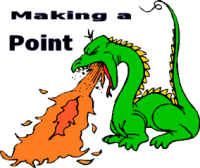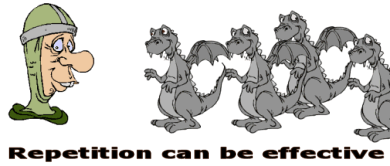

Making a point
In the previous level of this course, we looked at ways of making a point in spoken English using devices such as rhetorical questions, irony and understatement. Most of these techniques also work with written English, but because with written English we have time to plan our sentences more carefully, there are also other ways of adding emphasis.
We have all seen these – they are the least subtle but nevertheless effective ways of stressing the important point in a sentence.
Fred, this is important! (Underline)
Fred, this is important! (Italics)
Fred, this is important! (Boldface)
Fred, this is IMPORTANT! (caps)
All of these have the same idea - the word which would be stressed (or shouted) in spoken English is made to look different in the rest of the sentence. However, while text variations are suitable for informal written English, they cannot be used to make a point in formal written texts such as reports or essays. Here we must be more creative.
These are used to pick out words from the rest of the sentence to make them more visible in a way that is acceptable in even formal written English
.Another punctuation idea is one often used in modern texting. While it is unacceptable to make the point in a formal text by writing, 'Best. Idea. Ever', you can write occasional very short sentences for emphasis:


Generally the most important words should come at the start of a sentence (for focus) or at the end (for surprise). To paraphrase Jane Austen:
Consider these two sentences
The second sentence makes the point much better because it begins and ends with a focus word.
To show that we want to make a particular point we can repeat it several times in different ways.
Ten o'clock is the time of the meeting. Try to arrive at ten o'clock or slightly before ten o'clock. Those arriving after ten o'clock will not be allowed to take part. So please be clear that the meeting must start at ten o'clock.

We can stress the point even more by asking a question which makes it clear what part of the text we want the reader to focus on. So we can make the previous text even more emphatic by beginning:
This is when we take the expected end of a sentence and say the opposite to make it more emphatic. So if we do not understand something we can say it is 'Clear as mud'. (Mud is not clear, so the subject is not clear either.) Other examples are:
Remember that these devices, and others such as sarcasm, rhetorical questions and irony are ways of making a point. Once you have made that point, move on – speech or writing that keeps hammering away at a point quickly becomes tiring. Techniques like these should be used carefully for maximum impact. Why? Because "Less is more".